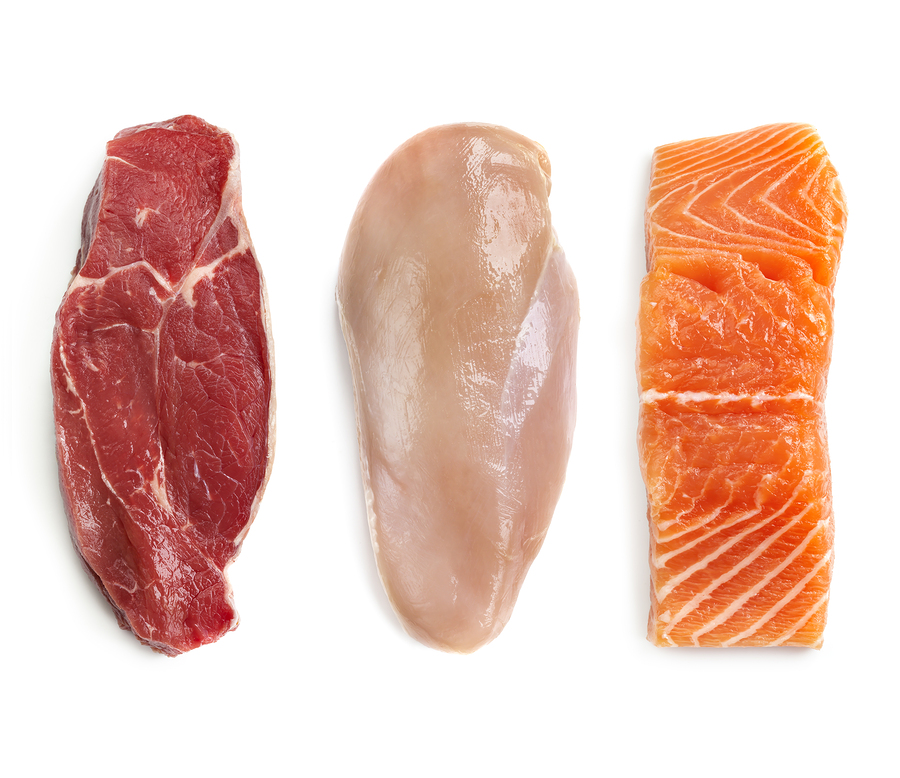In light of recommendations for heart healthy eating from national professional organizations encouraging Americans to limit their intake of meat, the beef industry commissioned and co-wrote a review of randomized controlled trials comparing the effects of beef versus chicken and fish on cholesterol levels published over the last 60 years. They found that the impact of beef consumption on the cholesterol profile of humans is similar to that of fish and/or poultry—meaning that switching from red meat to white meat likely wouldn’t make any difference. And that’s really no surprise, given how fat we’ve genetically manipulated chickens to be these days, up to ten times more fat than they had a century ago (see Does Eating Obesity Cause Obesity?).
There are a number of cuts of beef that have less cholesterol-raising saturated fat than chicken (see BOLD Indeed: Beef Lowers Cholesterol?), so it’s not so surprising that white meat was found to be no better than red, but the beef industry researchers conclusion was that “therefore you can eat beef as part of a balanced diet to manage your cholesterol.”
Think of the Coke versus Pepsi analogy. Coke has less sugar than Pepsi: 15 spoonfuls of sugar per bottle instead of 16. If studies on blood sugar found no difference between drinking Coke versus Pepsi, you wouldn’t conclude that “Pepsi may be considered when recommending diets for the management of blood sugars,” you’d say they’re both equally as bad so we should ideally consume neither.
That’s a standard drug industry trick. You don’t compare your fancy new drug to the best out there, but to some miserable drug to make yours look better. Note they didn’t compare beef to plant proteins, like in this study published in the American Journal of Clinical Nutrition. As I started reading it, though, I was surprised that they found no benefit of switching to a plant protein diet either. What were they eating? You can see the comparison below:
For breakfast, the plant group got a kidney bean and tomato casserole and a salad, instead of a burger. And for dinner, instead of another burger, the plant protein group just got some boring vegetables. So why was the cholesterol of the plant group as bad as the animal group? They had the plant protein group eating three tablespoons of beef tallow every day—three tablespoons of straight beef fat!
This was part of a series of studies that tried to figure out what was so cholesterol-raising about meat—was it the animal protein or was it the animal fat? So, researchers created fake meat products made to have the same amount of saturated fat and cholesterol by adding extracted animal fats and cholesterol. Who could they get to make such strange concoctions? The Ralston Purina dog food company.
But what’s crazy is that even when keeping the saturated animal fat and cholesterol the same (by adding meat fats to the veggie burgers and making the plant group swallow cholesterol pills to equal it out), sometimes they still saw a cholesterol lowering advantage in the plant protein group.
If you switch people from meat to tofu, their cholesterol goes down, but what if you switch them from meat to tofu plus lard? Then their cholesterol may stay the same, though tofu and lard may indeed actually be better than meat, since it may result in less oxidized cholesterol. More on the role of oxidized cholesterol can be found in my videos Does Cholesterol Size Matter? and Arterial Acne.
Just swapping plant protein for animal protein may have advantages, but if you really want to maximize the power of diet to lower cholesterol, you may have to move entirely toward plants. The standard dietary advice to cut down on fatty meat, dairy, and eggs may lower cholesterol 5-10%, but flexitarian or vegetarian diets may drop our levels 10 to 15%, vegan diets 15 to 25%, and healthier vegan diets can cut up to 35%, as seen in this study out of Canada showing a whopping 61 point drop in LDL cholesterol within a matter of weeks.
In health,
Michael Greger, M.D.
*Article originally appeared at Nutrition Facts.












